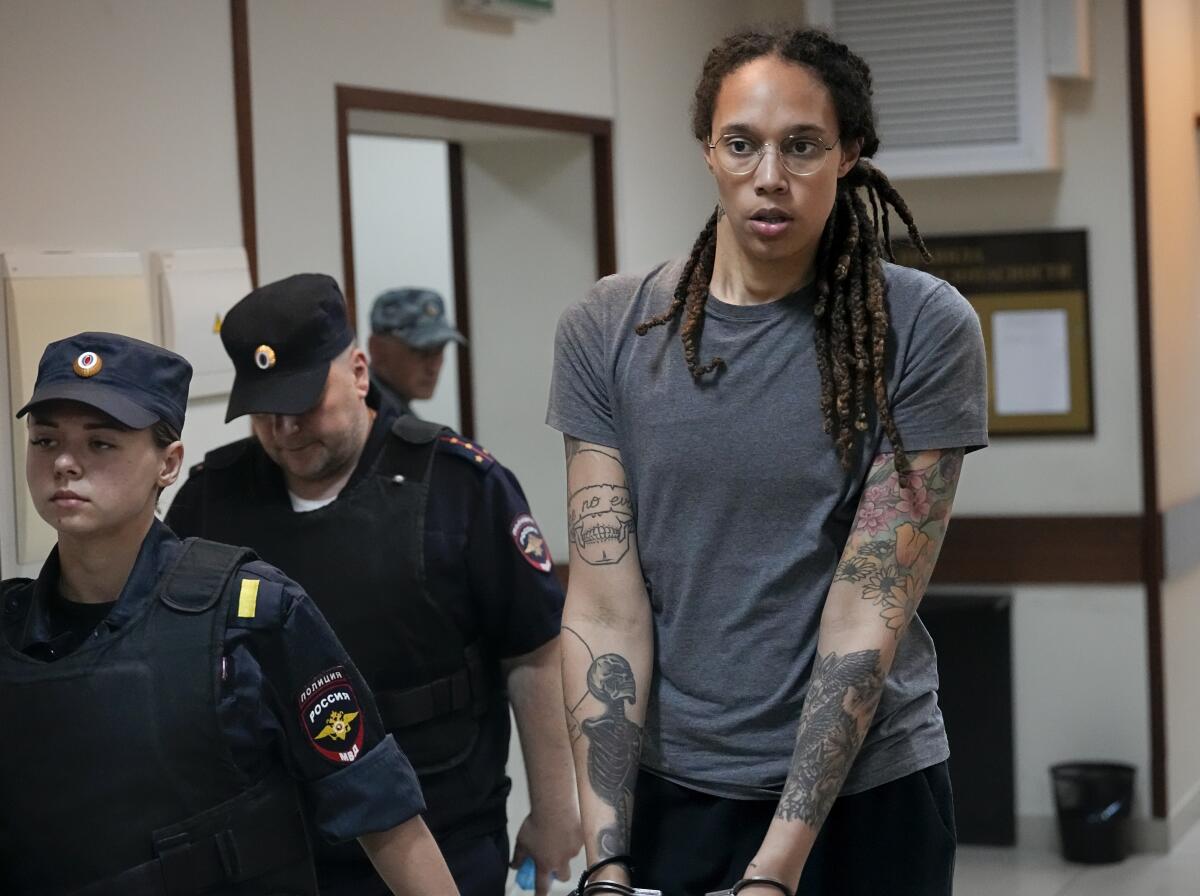Column: Brittney Griner was a great start. How about freeing the 35 men at Guantánamo Bay?

- Share via
Earlier this year a man by the name of Saifullah Paracha was released from prison. We had kept the now-75-year-old locked up since 2003 without ever charging him with a crime.
Since about as soon as Guantánamo Bay was first used to hold people deemed “enemy combatants,” its existence has always been contrary to the principles we espouse abroad. Imagine continuing to criticize human rights violations by other nations when the entire world knows we’ve been holding prisoners for nearly 20 years without a trial or even charges.
Opinion Columnist
LZ Granderson
LZ Granderson writes about culture, politics, sports and navigating life in America.
When news broke that WNBA star Brittney Griner was arrested in Russia, we started talking about the other Americans being detained unjustly around the world.
We talked about the economics of women’s sports and why incredible female athletes like Griner are forced to play in countries like Russia to supplement their income.
We even debated whether negotiations would move faster if the prisoner were LeBron James.
You know what we didn’t spend too much time talking about? Gitmo.
If the Biden administration and the new Congress are hungry for bipartisanship, stop spending $500 million a year to keep 35 men in a “forever prison” in Cuba.
After 10 months behind bars in Russia, including time in a penal colony, Griner finally stepped foot back on U.S. soil Friday morning.
Her saga also shined a light on Paul Whelan, who was arrested in Moscow in 2018. U.S. officials said Russia refused to negotiate Whelan’s release. White House Press Secretary Karine Jean-Pierre said: “It was a choice between bring home one American or none.” My hope is that Whelan is brought home soon as well. I can’t imagine what his loved ones are going through.
Look, it’s politics. Maybe Whelan’s release wasn’t even on the table. So here we are, and regardless of how happy people are about Griner, the decision to exchange her for Viktor Bout, a notorious arms dealer known as the “Merchant of Death,” was always going to be second-guessed.
The details that shaped this chapter will gradually disappear from the conversation and by the time 2024 rolls around “basketball player” and “Merchant of Death” will be all most will remember.
Sadly, Americans prefer our foreign policy be discussed in black-and-white terms. The gray stuff, of which there is a great deal, requires more than most are willing to invest. Just point us in the direction of the bad guy with the understanding it will never be the U.S. because we’re the “greatest country on Earth.”
However, Griner’s story is a humbling reminder that greatness has its limits. Negotiations require a willing partner, and for months Russian President Vladimir Putin was not one.
And then there’s the question of leverage. Typically, the party most willing to walk away empty-handed is the one in the driver’s seat. Because we don’t walk away from detained Americans, leverage in prisoner swap negotiations is not exclusively ours.
But those are all details.
And we don’t like those very much.
If we did, Guantánamo Bay would already be closed.
The unpleasant fact is that while the U.S. is somewhat helpless when it comes to Whelan, we are not helpless about the fates of the prisoners we are responsible for at Guantánamo. No one should be held for years without charges and a trial. It’s a pesky little “detail” that should matter, especially in a country in love with the word “freedom.”
In a plot twist suited for a Tarantino spaghetti western, the country where Bout started his cargo company — and became the “Merchant of Death” — also happens to be the country the Biden administration thanked “for helping to broker this transaction” for Griner: the United Arab Emirates. A country known for its lax attitude surrounding terrorist financing.
We may want to talk about foreign policy in black and white, but we have to live in the gray. We should still try to do the right thing.
The Biden administration was right to make a deal for Griner’s release, despite the risks.
And of course there would be a political risk to whatever administration finally closes the prison at Guantánamo Bay. Maybe not all of those 35 detainees should simply be released. After all, U.S. intelligence officials once believed Paracha was a dangerous man. Still — no charges for nearly 20 years?
There may be a price to closing the prison, but what is it really costing us each day we keep it open? Griner’s return home not only offers us cause for celebration but also an opportunity to address the conspicuous skeleton in our own closet.
More to Read
A cure for the common opinion
Get thought-provoking perspectives with our weekly newsletter.
You may occasionally receive promotional content from the Los Angeles Times.












